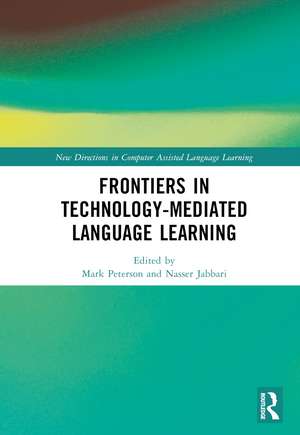Frontiers in Technology-Mediated Language Learning: New Directions in Computer Assisted Language Learning
Editat de Mark Peterson, Nasser Jabbarien Limba Engleză Hardback – 12 dec 2023
This edited volume is designed to showcase a selection of recent cutting-edge innovations. This publication incorporates chapters dealing with the use virtual reality, social networking, speech technologies and social semiotics. Also included are chapters that focus on the relevant review work that is vital for progress in the field.
This publication provides an indispensable guide to a wide range of practitioners, including language educators, researchers, graduate students, learning scientists and instructional designers.
Preț: 1001.55 lei
Preț vechi: 1221.40 lei
-18% Nou
Puncte Express: 1502
Preț estimativ în valută:
191.65€ • 200.60$ • 159.51£
191.65€ • 200.60$ • 159.51£
Carte tipărită la comandă
Livrare economică 31 martie-14 aprilie
Preluare comenzi: 021 569.72.76
Specificații
ISBN-13: 9781032497266
ISBN-10: 1032497262
Pagini: 154
Ilustrații: 21 Tables, black and white; 11 Line drawings, black and white; 14 Halftones, color; 25 Illustrations, color
Dimensiuni: 178 x 254 x 11 mm
Greutate: 0.49 kg
Ediția:1
Editura: Taylor & Francis
Colecția Routledge
Seria New Directions in Computer Assisted Language Learning
Locul publicării:Oxford, United Kingdom
ISBN-10: 1032497262
Pagini: 154
Ilustrații: 21 Tables, black and white; 11 Line drawings, black and white; 14 Halftones, color; 25 Illustrations, color
Dimensiuni: 178 x 254 x 11 mm
Greutate: 0.49 kg
Ediția:1
Editura: Taylor & Francis
Colecția Routledge
Seria New Directions in Computer Assisted Language Learning
Locul publicării:Oxford, United Kingdom
Public țintă
Academic and PostgraduateNotă biografică
Mark Peterson is Associate Professor of Foreign Language Studies at Kyoto University. He has published widely in the field of computer assisted language learning. He is the author of Computer Games and Language Learning (Palgrave) and editor of Digital Games and Language Learning: Theory, Development and Implementation (Bloomsbury). Dr Peterson established and now directs a research lab (https://petersonlab.weebly.com) dedicated to investigating the effective use of digital technologies in foreign language learning.
Nasser Jabbari is a Lecturer in Applied Linguistics and Language Teaching at the University of Essex (UK) Department of Language and Linguistics. He received a PhD (in curriculum and instruction, English as a second language [ESL]) from Texas A&M University (USA). His research interests include ‘naturalistic’ and ‘tutorial’ computer assisted language learning (CALL), specifically, language use and learning in social media and online gaming environments. His current research focuses on the psycholinguistic and sociocultural processes underlying second language acquisition (SLA) and second language (L2) socialization in multilingual and multicultural contexts of massively multiplayer online (role-playing) games.
Nasser Jabbari is a Lecturer in Applied Linguistics and Language Teaching at the University of Essex (UK) Department of Language and Linguistics. He received a PhD (in curriculum and instruction, English as a second language [ESL]) from Texas A&M University (USA). His research interests include ‘naturalistic’ and ‘tutorial’ computer assisted language learning (CALL), specifically, language use and learning in social media and online gaming environments. His current research focuses on the psycholinguistic and sociocultural processes underlying second language acquisition (SLA) and second language (L2) socialization in multilingual and multicultural contexts of massively multiplayer online (role-playing) games.
Cuprins
1 Contemporary computer assisted language learning: A view from the frontiers of research 2 Genre-based L2 research writing: SLA-CALL interfaces for prototyping an interactive virtual reality environment 3 Effects of English-speaking lessons in virtual reality on EFL learners’ confidence and anxiety 4 Automatic speech recognition as a source of corrective feedback on L2 pronunciation 5 Fostering cross-cultural communication and awareness through social Networking technologies: A case study of virtual exchange 6 From digital tools to digital others: A social semiotic technologies approach for studying learner interactions with screen-based resources 7 AR-enhanced second and foreign language instruction and practice: A systematic review of instructional designs, theoretical underpinnings, and research focus 8 A Systematic Literature Review of Automatic Speech Recognition in L2 Learning: A Case for L2 Writing
Descriere
This edited volume is designed to showcase a selection of recent cutting-edge innovations. This publication incorporates chapters dealing with the use virtual reality, social networking, speech technologies and social semiotics.



